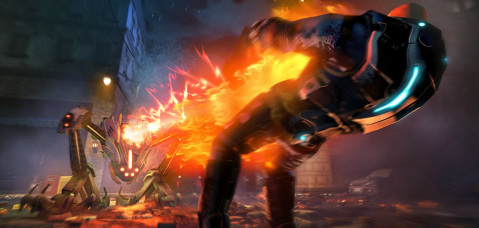It contains a reward loop that digs its hooks in, tense tactical battles, and a moderately deep strategic level. It does all of that stuff well. But what it does amazingly well is make character death an exciting part of playing.
Now, there is a caveat to all of this: Ironman Mode. This optional mode makes it so that you cannot reverse the choices you make by loading a previous save. You have only one save file, and it is continually auto-saving so that all decisions are final. I firmly believe that the game is at its best when played like this. You could, of course, play it like this without turning that mode on. But it's there because you'll want to revert a decision at some point. You will regret something when you play this game. Ironman makes you move on despite the regret.
And that's the crux of what I love about it. You feel like your choices matter. Your squad of soldiers from around the world is thrown into bizarre firefights with horrific aliens where lots of things can kill them. If you fall behind in the arms race with the aliens, they die. If you move them to risky positions on the battlefield, they die. If you don't know your enemy's capabilities, they die. Despite the random number generator the game uses to decide what hits or misses, the ball is almost always in your court. And, until several failures pile up, you live with your bad calls. A failed mission is a setback, but maybe one that you can fight back from. Maybe it was what you needed to rethink your strategy and renew your attack. It's both stressful and exhilarating.
It stands out against the vast majority of games in which the only way to progress is to succeed. In a standard single-player game like Uncharted, if you fail at a challenge, the game stops. It seems to make sense (why wouldn't you want to succeed at a challenge), but it creates a very flat experience. It creates a story in which the character always succeeds (since the deaths never happened in terms of the final game story) except where the designers of the game dictated some kind of setback.
Now, other strategy games do what XCOM does and have been for many years. But there is a difference between losing a unit of infantry in a Total War game and losing Jake Smith from Australia in XCOM. It goes to great lengths to make you care about the characters. Even though they can be replaced (apparently XCOM has no problem with recruitment), there is a feeling of loss each time a soldier dies. And the methods the game uses to foster that connection are pretty clever. Every soldier has a name (which you can change) and a nationality. They also gain new abilities, speak in a variety of voices, and (as of the Enemy Within expansion) are awarded medals. All of this helps establish them as a specific soldier as opposed to one more grunt on the front lines.
The Souls series (Demons' Souls, Dark Souls) also use this concept. Those games build failure into the game, making a death a part of the experience as opposed to a simple game over screen. I think it's one of many ways those games have found of creating an engaging narrative. But, in the interests of keeping this post manageable, I'll speak about those games later.
This creates a story that is much more varied. Sure, I was able to defeat the aliens in New York, but I lost Jean-Luc Lamy, the French support soldier that had been in every mission since the start of the game. And now the next mission isn't just another bug hunt outside a crashed UFO, but a shot at vengeance for Lamy's comrades.
This kind of player-created narrative (often called inferred narrative) is one of my favorite things in gaming. And while it would be possible in any game with random events, the emotional connection caused by the high stakes, personal investment, and humanization of game characters makes XCOM really excel at it.
So, go get some fine soldiers killed and enjoy the hell out of the game.

 RSS Feed
RSS Feed